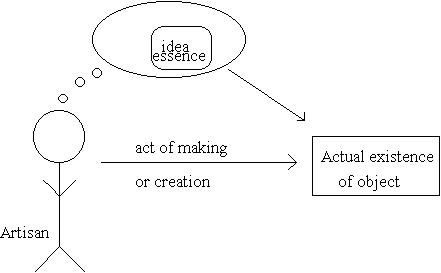Summary of Some Main Points
from Sartre's Existentialism and Human Emotions
Lecture Outline
Entire Lecture can be
found here
I. Absolute Individuality and Absolute Freedom.
The Existentialist conceptions of freedom and value arise from their view of the individual. Since we are all ultimately alone, isolated islands of subjectivity in an objective world, we have absolute freedom over our internal nature, and the source of our value can only be internal.
II. The Existentialist View of Human Nature.
Existentialism is defined by the slogan Existence precedes Essence. This means:
1. We have no predetermined nature or essence that controls what we are, what we do, or what is valuable for us.
2. We are radically free to act independently of determination by outside influences.
3. We create our own human nature through these free choices.
4. We also create our values through these choices.
The Existentialist View (We create our own nature.): We are thrown into existence first without a predetermined nature and only later do we construct our nature or essence through our actions.
EXISTENCE PRECEDES ESSENCE

This slogan is opposed to the traditional view that Essence precedes Existence, according to which we are seen as having a given nature that determines what we are and what our ultimate purpose or value is. We are understood by analogy to artifacts which are made with a pre-existing idea or concept of what they will be and what they will be good for.
The Traditional View (which Sartre argues against):
ESSENCE PRECEDES EXISTENCE

The human situation for the Existentialist is thus characterized by:
1. Facticity (throwness): We find ourselves existing in a world not of our own making and indifferent to our concerns. We are not the source of our existence, but find ourselves thrown into a world we don't control and didn't choose.
2. Anxiety: We are faced with the lack of any external source of value and determination. We are faced with the responsibility of choosing our own nature and values, and, in doing so, we are faced we must face the awesome responsibility of choosing human nature and values for all men in our free choices.
3. Despair: In seeing the contrast between the world we re thrown into and which we cannot control and the absolute freedom we have to create ourselves, we must despair of any hope of external value or determination and restrict ourselves to what is under our own control.
III. Objections and Replies:
A. What is Freedom?
1. The problem: How can we be free if our bodies, our abilities, and our environment are determined?
2. The solution: (a) Even though all these factors may be determined, we are more than simply these things. Our real self lies beyond the reach of external determination in virtue of its absolute individuality.
(b) Our freedom is a freedom of synthesis: even though the many factors that go into making us and our experience are determined, we can arrange them as we like. We are free to make of them, and ourselves, whatever we will.
B. What is Happiness?
1. The problem: How can man be happy in a world devoid of external significance and meaning?
2. The solution: The loss of external value allows us to get value from within ourselves, a value that is greater because it cannot be taken away by external forces.
C. How ought we to act?
1. The problem: If our only moral rule is to act authentically, to choose our own values instead of taking them from external sources, can't we really do anything we want, no matter how evil or selfish?
2. The solution:
a. In choosing our own nature we must choose human nature for all humanity. In order to act freely, we must not let our action be determined by any of our particular desires or interests. We must act as any free agent would act, hence we must act as we would like other people to act.
b. In order to be free ourselves, we must desire the freedom of other people. To treat another person merely as an object for my use is to make an object of myself. To be free I must respect the freedom of others.
c. Even though my actions are free, they are not completely arbitrary. Just as the artist, while free to create, follows the constraints imposed by her medium, so our actions, while not governed by rules, are constrained by the choices we and others have made.